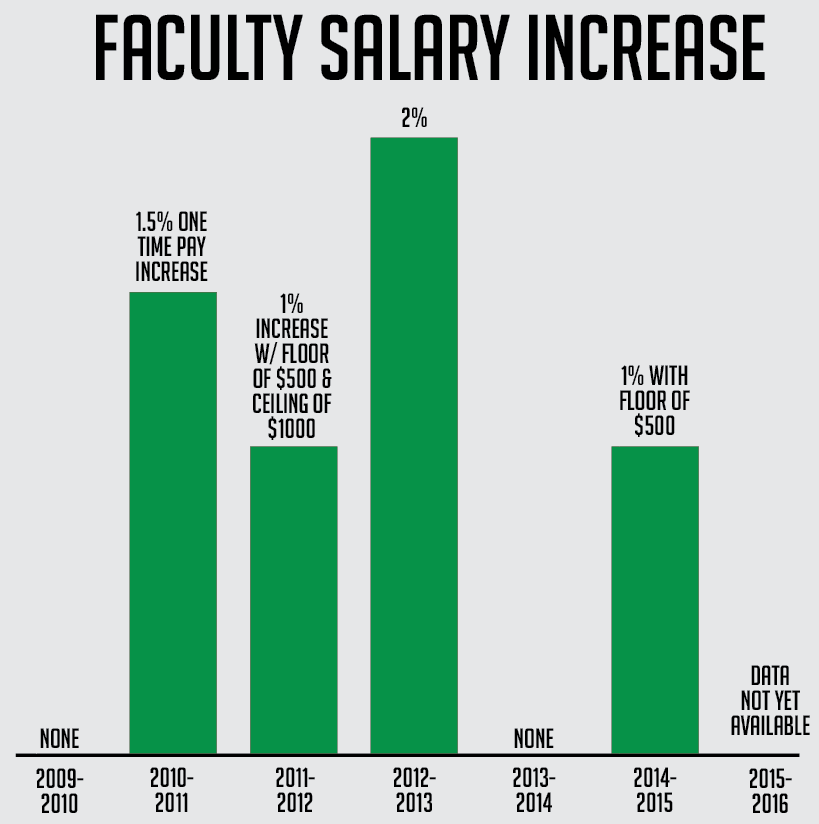Faculty, staff salaries could see a boost soon
September 24, 2015
Salary increases may be coming soon after about eight years without a significant change, according to President Gary Ransdell.
“There will be increases in the future,” he said. “How they will be factored into next year’s budget is yet to be determined.”
Ann Mead, the senior vice president for the Division of Finance and Administration, said in an email interview that a salary increase was not possible for this year, but may be possible for next year depending on what becomes available.
“We develop a budget every spring, and in each budget cycle, we assess how to fund fixed cost increases and salary increases for all university employees …there hasn’t been sufficient growth in tuition or state general fund revenue to fund a salary increase this year,” she said. “While President Ransdell reiterates the importance of competitive salaries and rewarding performance, no decision can be made until we know if we have the capacity to fund a salary adjustment pool.”
Ladonna Hunton, associate vice president for Academic Budgets and Administration, said in an email interview that if WKU receives state funding, some of it will be used for a salary increase for faculty and staff.
“Although no guarantees have been extended, it is hoped that we will be able to use a portion of any increase in state funding appropriated to WKU to support a salary increase for both faculty and staff,” she said.
Ransdell said state funding, if WKU receives it, will be used mostly for salary increases.
“I’ve made it clear that most, if not all, of any state appropriations we might get will be devoted to compensation,” he said. “And we’re going to work as hard as we can this spring in the Kentucky General Assembly to improve higher education funding.”
He added that any revenue generated by any tuition increases would be used as well.
“Short of that, or beyond that, we will take whatever revenue is generated from whatever tuition increase we might experience next year, which is likely to be in the 3 percent range, to cover any increased cost obligations that are inherent in our budget from one year to the next, and compensation,” Ransdell said.
Ransdell said they are looking into investing more into benefits for faculty and staff.
“We already know that we have to invest more in benefits — healthcare, primarily — to shield our faculty and staff from increases in their premiums. And I’m working with the benefits committee right now to determine what that investment will require,” he said. “My goal is to avoid any cost increases for faculty and staff.”
Ransdell added that the administration wants to ensure faculty and staff are compensated for their hard work.
“We want to make sure faculty and staff are inspired to do their work with our students, and there is a correlation with how they’re compensated,” he said.
He also said it was way too early to speculate about how large an increase would be.
According to the Faculty Work Life Survey Fall 2014/Spring 2015, 50 percent of 314 respondents said they strongly disagreed when asked to rate their level of agreement with the statement “I am satisfied with the merit increase process.”
Furthermore, only 2.87 percent strongly agreed with the statement and 5.73 percent were rated as agreeing with the statement.
The survey also asked respondents to rate their level of agreement with statements concerning Ransdell’s performance as university president.
The survey reported 40.56 percent of 360 respondents strongly disagreed that Ransdell “works to provide adequate pay raises and equitable compensation packages for faculty.”
A combined total of 17.5 percent of respondents strongly agreed and agreed with the statement.
Jeanine Huss, associate professor of the school of teacher education, said any salary raise should be used to make the situation more equal between recent hires and older faculty.
“The longer you’re here, the worse your pay rate is,” she said. “To me, the main thing is trying to make it equitable. People coming in as an assistant professor are making what I am as an associate. People who have been here longer need more of a pay raise than recent hires.”






















![Students cheer for Senator at Large Jaden Marshall after being announced as the Intercultural Student Engagement Center Senator for the 24th Senate on Wednesday, April 17 in the Senate Chamber in DSU. Ive done everything in my power, Ive said it 100 times, to be for the students, Marshall said. So, not only to win, but to hear that reaction for me by the other students is just something that shows people actually care about me [and] really support me.](https://wkuherald.com/wp-content/uploads/2024/04/jadenmarshall-600x422.jpg)

